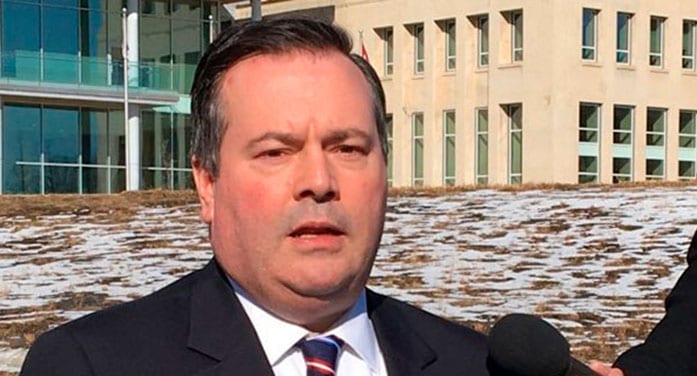 For more than three decades, Alberta Premier Jason Kenney has been one of the leading political figures in Canada’s conservative movement.
For more than three decades, Alberta Premier Jason Kenney has been one of the leading political figures in Canada’s conservative movement.
The 53-year-old headed the Canadian Taxpayers Federation in the 1990s and has been a strong advocate for low taxes, limited government and fiscal responsibility ever since.
He served as a Reform Party, Canadian Alliance and Conservative MP from 1997 to 2016, and never lost his seat. He was a senior cabinet minister for Prime Minister Stephen Harper in National Defence and Immigration.
He helped unite the right in Alberta under the banner of the United Conservative Party. He’s served as premier since 2019 after defeating Rachel Notley’s NDP and returning the province to its conservative roots.
Yet, in a stunning reversal of fortune, Kenney’s political career now dangles by the thinnest of threads.
On May 18, Kenney faced the results of a leadership review. Party activists demanded the review primarily due to growing frustration over his policies and positions during COVID-19 lockdown measures. They perceived his leadership as being too moderate, barely conservative or not conservative at all.
A 50 per cent plus one threshold was set for him to stay on as leader. While his popularity numbers in Alberta fell to 31 per cent last June, according to the Angus Reid Institute, they appeared to have stabilized among UCP supporters. He and his team seemed confident they would survive the vote by a decent enough margin. So much so that the premier appeared in front of the U.S. Senate energy committee in Washington to discuss Alberta oil the day before the results of the review were released.
This perception wasn’t even close to reality.
| RELATED CONTENT | |
| Trust in the competence of politicians, health experts eroding By Marco Navarro-Genie |
|
| Jason Kenney right person to lead Alberta By Michael Taube |
|
| Clowns to the left of me, jokers to the right By Doug Firby |
|
|
Kenney only received 51.4 per cent support. While he barely passed the threshold he previously set, he acknowledged it was too low to continue as leader and announced he would be stepping down. He said he would stay in his legislative seat and remain at the helm until the UCP chose a new leader.
Surprisingly, the UCP caucus decided not to move forward with Kenney’s resignation for now.
“We agreed that we must remain united, focused on the best interests of Albertans, and committed to doing the job Albertans elected us to do,” caucus chair Nathan Neudorf said in a May 19 press release. “In that spirit, we have affirmed Premier Jason Kenney’s continued leadership of our caucus and government until such time as a new leader is chosen, the timing of which will be determined by the United Conservative Party.”
Whether this turn of events means Kenney will stay on for several weeks, six months or until the next mandated Alberta election on May 29, 2023, is anyone’s guess. Regardless, it’s undoubtedly been a sobering experience for the premier – especially because this criticism is largely unfounded.
“Kenney has led an energetic, reform-oriented, conservative government,” Sean Speer, a former senior adviser to Harper, wrote in the National Post on May 3. “Notwithstanding an extraordinary set of economic and fiscal challenges, his United Conservative government has carried out an ambitious program of policy reform that deserves greater attention and respect from Conservatives (and conservatives) across the country.”
How so?
“The Kenney government has cut the province’s corporate tax rate by a third, reduced regulatory requirements by about one-quarter and maintained flat or declining program spending on a sustained basis,” Speer noted, and he oversaw the “fastest-growing economy in the country and the province’s first balanced budget in more than a decade.” The premier also expanded school choice, moved some surgeries to private clinics and hospitals, and provided “national leadership on internal trade and labour mobility.”
These accomplishments fell by the wayside or down a rabbit hole of lost memories due to COVID-19.
Many Albertans and UCP members understandably wanted to regain their freedoms lost during pandemic restrictions. They’re furious at the amount of public spending coming from a premier who’s long touted fiscal prudence and less government interference.
When Kenney tried to lift all COVID-19 measures during the fourth wave, he had to reverse course when hospitalization rates and deaths spiked – reaching the highest such levels in Canada for a spell. He was heavily criticized for this flip-flop and never quite regained his footing.
Was this criticism justified?
No.
Like most leaders on the right and left, Kenney made mistakes during the pandemic that he subsequently apologized for. Yet his stellar political record was thrown out the window by almost half the party faithful because they expected him to act and lead in a way that virtually no fiscally conservative politician has done during COVID-19.
Some political analysts are suggesting Kenney’s apparent fall from grace could be of significant concern to other Conservative leaders and the federal leadership race.
It’s certainly possible. If Conservative party activists keep setting impossibly high standards for politicians to achieve, and abandon them when they’re not met, this doesn’t bode well for the future.
Michael Taube, a Troy Media syndicated columnist and Washington Times contributor, was a speechwriter for former prime minister Stephen Harper. He holds a master’s degree in comparative politics from the London School of Economics. For interview requests, click here.
The opinions expressed by our columnists and contributors are theirs alone and do not inherently or expressly reflect the views of our publication.
© Troy Media
Troy Media is an editorial content provider to media outlets and its own hosted community news outlets across Canada.
